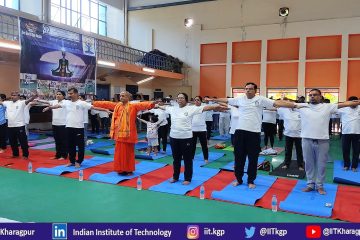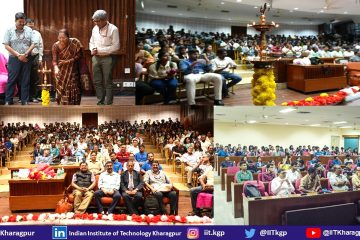IIT Kharagpur and The University of Edinburgh, UK have launched a virtual student mobility programme to gain insights on water-energy-food-public health from diverse perspectives, and analysis of the same with a transdisciplinary approach. The programme would facilitate capacity building and gainful research toward inclusive and sustainable development.
The proposed virtual programme focuses on developing domain knowledge of the participants, particularly in the Indian context, integrating ideas and expertise through group activities on the thematic areas. Under this programme and identifying the issues, the participants will work under the mentorship of faculty members IIT Kharagpur and the University of Edinburgh, before opting for a possible physical mobility programme.
“We expect this virtual mobility programme to be helpful to the students from both UK and India toward their fruitful participation in a possible physical mobility programme. Further, experiences and feedback from this virtual programme will also benefit the organizers to revise the structure of this proposed physical mobility programme in the right direction and toward greater success,” said Prof. B C Meikap, organizing committee member at IIT Kharagpur.
Around 20 students from IIT Kharagpur and 20 students from The University of Edinburgh will participate in this programme over a period of five days during 24-28 May 2021.
Talking about how the programme will help students at IIT Kharagpur, Prof. Pulak Mishra said, “It will provide understanding of the critical issues from diverse perspectives, and seeing the socio-economic and behavioural aspects through the lenses of the Edinburgh students as well. Such interactions, exchange of ideas, co-working and cross-learning will grow the critical and transdisciplinary understanding of the IIT Kharagpur students on this complex domain of water-energy-food-public health relationships.”
The issues and underlying dynamics of water-energy-food-public health relationships are quite complex in different socio-economic, policy and institutional setups. In addition to innovation and development of appropriate technologies in these areas, their acceptance, adaptation and outcomes depend on various social, economic, behavioural, cultural, policy related and institutional factors. Further, often these social, economic, policy and institutional aspects also set the directions for further research and development in the related areas. Such both way implications require sharing and convergence of knowledge, expertise and emerging issues in the related fields through rigorous brainstorming and exchange of ideas and collaboration in teaching and research. The virtual mobility programme is expected to create the right platform in this regards.
“The programme will offer our students, opportunities to enrich their knowledge and research aptitude under the mentorship of the renowned faculty members of the University of Edinburgh. Experiences from such a joint programme will also benefit the participating faculty members of IIT Kharagpur in strengthening their joint research proposals with Edinburgh counterparts,” added Prof. Bhagirath Behera.
Since 2010, the Mumbai office of the University of Edinburgh, led by Regional Director Amrita Sadarangani, has been instrumental in developing a network of impactful activities in India, ranging from research collaborations with leading universities through to student-centered activities such as the ‘Fashion Trek’. The Virtual Student Mobility programme will fit wonderfully within this ever-growing narrative. Further, it will take the academic collaboration between IIT Kharagpur and The University of Edinburgh forward.
“The 20 participating Edinburgh students will become knowledgeable ambassadors for Indian people and culture, with expertise and insights they can bring to their further studies. In summer 2019, the University of Edinburgh’s Study and Work Away Service commissioned a study ‘Barriers to International Experience’. Students identified short-term opportunities such as this an important mobility option and this programme can become an exemplar for similar future initiatives.” said Prof. Neil Robertson from of The University of Edinburgh



